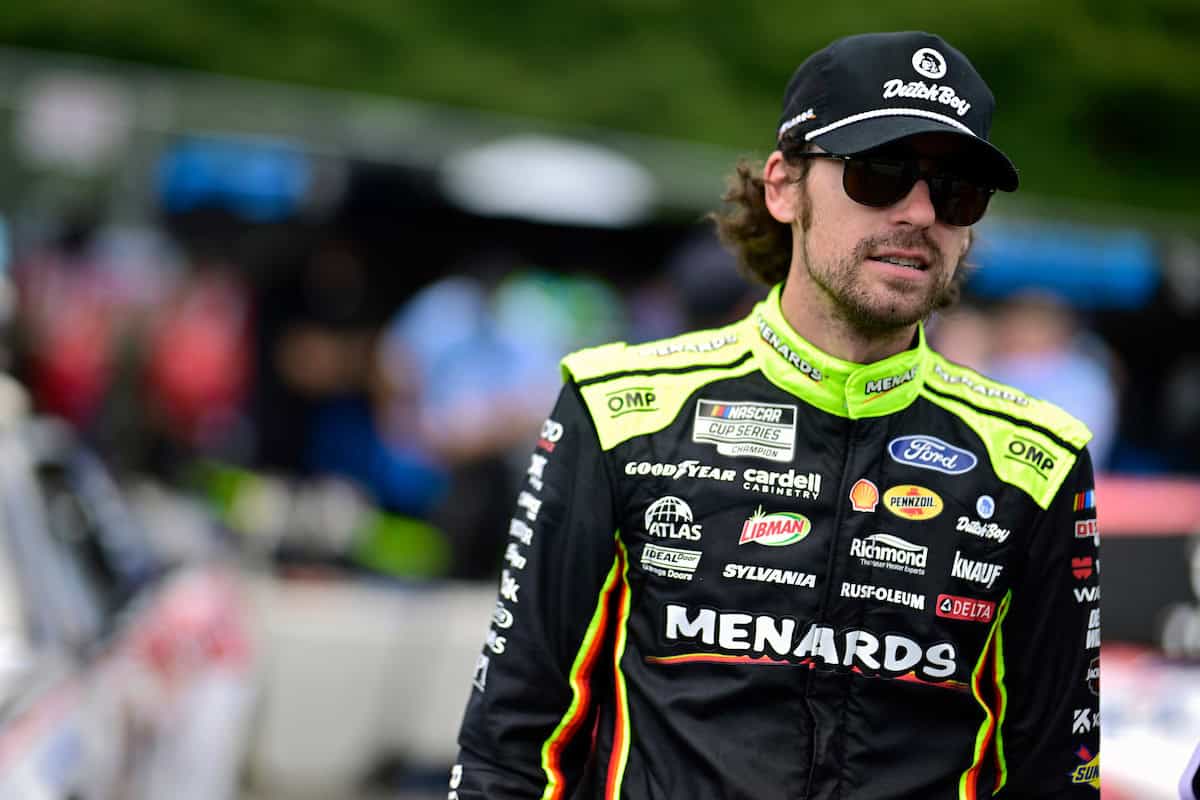Ryan Blaney had a fast No. 12, but a nightmare of a Sunday (July 13) at Sonoma Raceway.
He first got moved out of line by Chase Briscoe toward the start of the race and then got sent off course by Chris Buescher while fighting for third in the middle of the race. Blaney lost a lap, but a free pass with four laps to go offered a glimmer of hope, only for him to get tagged by a spinning Kyle Larson in one final blow that knocked him out of the race and left him a 36th-place finish.
Blaney now has seven DNFs in 2025 and to say he was frustrated during his trip to Wine Country would be an understatement.
Blaney is notorious for being vocal on the radio, especially in the heat of the moment. However, for the number of times he threatens retaliation on the radio waves, he seldom delivers payback, if at all.
On Monday (July 14), he addressed comments that he talks a big game but doesn’t typically follow through.
In a world of NASCAR that has become pronounced with over aggression, is Blaney’s mindset of proper etiquette the right one? Or is it a mindset that’s costing him?
Yes, If He Lets Others Push Him Around
You can’t accuse Ryan Blaney of not being a team player. He takes care of his equipment and tries not to make extra work for his crew whenever it’s avoidable.
His post-race celebrations are as gentle on his racecars as possible.
And his generosity even extends to other teams.
Blaney admits he gets frustrated with other drivers when he gets spun or raced too aggressively. He’ll threaten to get even on the radio at the time, but he says he doesn’t act on his emotions and retaliate against them out of respect for their teams.
Does this mindset benefit Blaney?
In some ways, sure.
Blaney is a past champion and respected on the track and in the garage. His reputation as a clean driver only helps that respect. Other drivers tend to at least think about curbing their aggression around drivers they respect.
The old gentleman’s agreement in racing is that drivers race each other the way they’re raced. So if they’re raced cleanly, they’ll return that favor down the road.
Which was great when drivers adhered to it.
That seems to happen less and less these days, though. There is a growing group of drivers who would wreck their own grandmothers for a win, and if that means there’s some collateral damage, so be it. They will also take out their frustrations on a hair trigger. They don’t care if somebody has to fix the car, or at least they don’t think about that in the moment.
In the long run, that might not make them a lot of friends or help on the track, but it can get them finishing positions and points. In the scheme of things, the question isn’t only about Blaney, but about drivers who are so clean that they hurt their own cause.
For Blaney and drivers with a similar mindset, it becomes a balancing act. If others avoid contact with them because they’re clean racers, that’s great. But they can also become targets. It’s a lot easier for an aggressive driver to move a passive one if he knows there’s no payback coming, whether it’s for stage wins or points late in a race, not just for race wins in the playoff era.
It’s not like other drivers think, “Oh, here’s Ryan Blaney, I’m just going to shove him out of the way.”
But in the heat of the moment when there’s a three-way real estate battle, there’s that back-of-mind knowledge that if you don’t back out, he either will, or at least he isn’t going to pay you back if you dump him.
For a veteran like Blaney, it might not be as costly as for a younger driver without any street cred. For drivers still trying to prove themselves, it’s often a case of getting pushed around by veterans until they make it clear that they will stand up for themselves.
Retaliation doesn’t have to mean hooking another driver into the wall – it shouldn’t.
Dirty driving is dirty driving and two wrongs don’t make a right. It might mean a bump-and-run for stage points or simply not backing out in a close situation and letting them face the consequences. It’s more about letting others know you can’t be pushed around without pushing back.
Think of a batter getting hit by an errant pitch and his teammate pitcher throwing an inch from the offending team’s batter’s chin, or even plunking him in the arm.
It’s a message, not an attempt at physical harm.
Blaney and others like him are right not to cross what’s often a very thin line. But that doesn’t mean they shouldn’t stand up for themselves when they’re on the receiving end of something intentional. In the long run, that will cost them points and even wins.
The gentlemen’s agreement is only good if everyone agrees. These days that’s no longer a given and it’s getting less so with each passing year. Some lines should not be crossed, but there are also lines to be held.
– Amy Henderson
No, But It Does Spark an Opportunity
Let’s be candid, being a ‘nice guy’ in motorsports is challenging.
If it wasn’t, we wouldn’t have the “nice guys finish last” mantra.
Now, that is more of a myth, considering that Blaney alone is a NASCAR Cup Series champion and multi-race winner.
Yet, it is not far-fetched to claim that Blaney’s code of conduct is a factor in some of the races he’s lost. Look no further than the spring race at Atlanta Motor Speedway, where Blaney was spun by Carson Hocevar while running inside the top five in the late going. He rebounded to finish fourth, which added more salt to the wound when considering what could have been if he had not been spun.
There are several races across Blaney’s career where he’s been the innocent bystander in someone else’s mess or hindered by another driver’s aggression and more than a handful have occurred when he has one of the fastest cars.
But while the ultimate goal of racing in general is to win, Blaney’s on-track, gentleman’s etiquette goes beyond checkered flags.
How so?
Revert to the 2023 NASCAR Craftsman Truck Series championship race at Phoenix Raceway, a race that turned into nothing short of a circus between on-track fights and shenanigans. The race and series itself was firmly criticized by Cup drivers, and it raised the question of whether racing etiquette existed at the developmental levels.
It hasn’t just been the Truck Series that has faced those questions, however.
Numerous incidents in the NASCAR Xfinity Series and the over-aggressiveness of select Cup drivers have put driver code under a completely different spotlight. The on-edge style of the Next Gen car has only illuminated those concerns.
What Blaney brings to the table is a respect in his driving, yet a persona that doesn’t sacrifice speed. He’s easily been one of the fastest drivers this season, augmenting the blow of the misfortunes he has experienced.
Blaney’s awareness and respect for both the physical and monetary investment made by teams is one that several others have, but fewer look to safeguard when the rubber meets the road. That quality is reflected in his own performance, where it is rare to see the 31-year-old make a mistake that ends his day and tears up the car.
Sure, Blaney’s emotions spill over in the moments his day gets thwarted by another driver’s issue, but that’s not uncommon. We can all remember a time when a frustrating moment got the best of our emotions. And even if there is that tension of vowing payback only to cool down shortly after, Blaney has the opportunity to be a voice in the garage that younger drivers can look to when it comes to racing etiquette.
Mark Martin, Matt Kenseth, Terry Labonte and others are examples of former drivers who were wronged on plenty of occasions, yet rarely retaliated in favor of keeping their equipment clean and staying true to their values. They were stable, steady voices who were the gatekeepers of racing etiquette.
With Blaney standing as both a veteran and champion of the sport, perhaps that next step is to direct that frustration into being a louder voice for respect across the sport. – Luken Glover
Amy is an 20-year veteran NASCAR writer and a six-time National Motorsports Press Association (NMPA) writing award winner, including first place awards for both columns and race coverage. As well as serving as Photo Editor, Amy writes The Big 6 (Mondays) after every NASCAR Cup Series race. She can also be found working on her bi-weekly columns Holding A Pretty Wheel (Tuesdays) and Only Yesterday (Wednesdays). A New Hampshire native whose heart is in North Carolina, Amy’s work credits have extended everywhere from driver Kenny Wallace’s website to Athlon Sports. She can also be heard weekly as a panelist on the Hard Left Turn podcast that can be found on AccessWDUN.com's Around the Track page.
Entering his fifth year with Frontstretch, Luken Glover is the author of The Underdog House, shedding light on the motivation and performance of NASCAR's dark horse teams as they strive to fight to the top. Additionally, Glover reports for the site at various events, and he contributes in the video editing department.
A 2023 graduate of the University of the Cumberlands, Glover is a middle school math and PE teacher, as well as a basketball coach. He is passionate about serving in his church, playing/coaching a wide variety of sports, and researching motorsports history.





